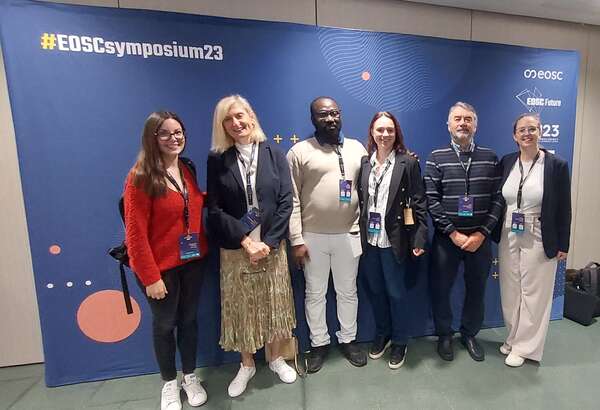
Unlocking Collaborative Horizons: CESSDA at EOSC Symposium 2023
This year's EOSC Symposium provided a dynamic platform for discussions and enlightening presentations, bringing together influential figures from the European Open Science Cloud (EOSC) community. Representatives from CESSDA ERIC, the Consortium of European Social Science Data Archives, played a role in various sessions, offering insights into the organisation's contributions and collaborative efforts within the EOSC framework whether through EOSC-related projects, Task Forces or its governance.
Revealing the EOSC Marketplace Capabilities
During the EOSC Marketplace breakout session, John Shepherdson, CESSDA Platform Director, and the leader of the work package responsible for EOSC's user-facing components in the EOSC Future project, presented an overview of the EOSC Portal capabilities. Emphasising the importance of a diverse range of resources, speakers of the session explored the benefits to researchers across disciplines and outlined the mechanism for adding resources to the Marketplace. This session highlighted the growing significance of a comprehensive and accessible research infrastructure.
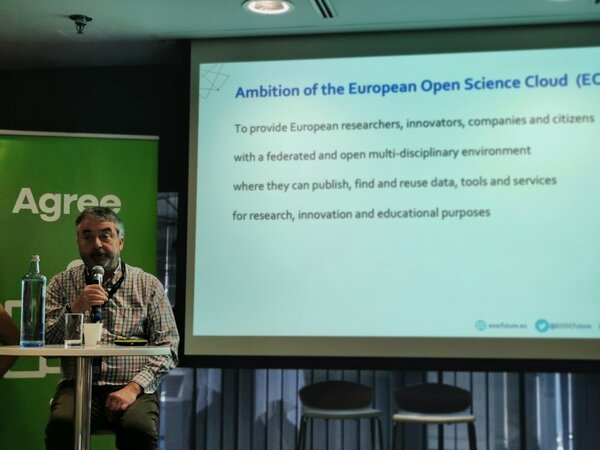
John Shepherdson, CESSDA Platform Director, presenting the work done in EOSC Future project
Long-Term Data Preservation and Harmonised PID Practices
The Data Sharing and Preservation Session, co-chaired by Hervé L'Hours, the CESSDA Trust Working Group Leader from CESSDA Service Provider at UK Data Service, delved into the EOSC Long Term Data Preservation Task Force. Insights into data federation and preservation were shared, featuring presentations and a lively interactive session on forthcoming draft recommendations. The focus of the recommendations items was the theme of transparency as it informs confidence in and interoperability between repositories. In the meantime, since the event, the task force recommendations became available for a public consultation (You can find the consultation document here!) and the group has initiated welcoming responses from a wide range of stakeholders across the digital object management lifecycle. Interested parties are asked to propose amendments to text or provide comments.
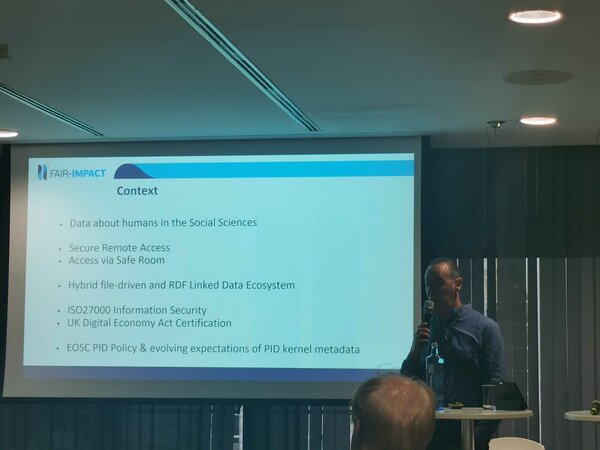
Hervé L'Hours from CESSDA-UKDS, CESSDA Trust Working Group Leader, presenting at the EOSC Symposium in context of the FAIR-IMPACT project
Hervé also participated in the Session on Harmonised PID practices for protected data covering ongoing work from the FAIR IMPACT project, another project where CESSDA partners are paricipating. He presented a use case on sensitive data sharing in the social sciences, a topic of outmost importance for CESSDA.
Interoperability and Global Collaboration
Several symposium sessions focused on interoperability within EOSC. The first such session started with a presentation on the Outcomes of the EOSC-Association Task Force for Technical Interoperability of Data and Services and included three examples of established interoperability frameworks in thematic communities and EOSC projects involving research infrastructures. One of the examples was the SSH Conversion Hub, an outcome of the Social Sciences and Humanities Open Cloud project, coordinated by CESSDA. The Conversion Hub was presented by Mari Kleemola (Finnish Social Science Data Archive, Tampere University, the finnish CESSDA archive, and CESSDA Tools Working Group Leader).
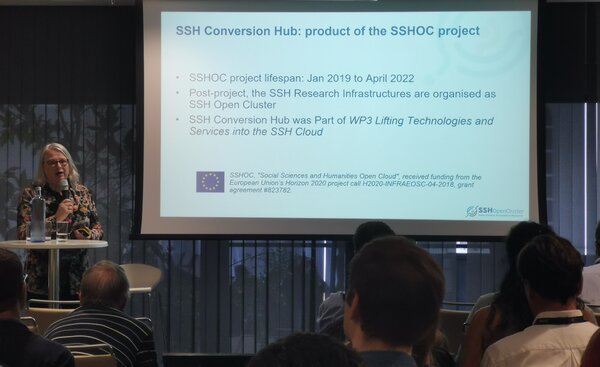
Mari Kleemola from CESSDA-UTA-FSD, CESSDA Tools Working Group Leader, presenting at the EOSC Symposium the SSHOC project results
Mari also participated in the in the session “Leveraging global data communities in regional initiatives and cross-border infrastructures”. After the introduction to RDA and Data Together three ESFRI Landmark´s perspectives were presented, namely CESSDA, CLARIN and ELIXIR perspective and RDA Foundation presentation about European support actions to promote RDA/Data together. Mari presented CESSDA’s experiences on global collaboration. The session ended in a panel discussion on benefits, strategies and impact and highlighted examples of how to leverage global data organisations in the Data Together coalition, especially the Research Data Alliance (RDA), to strengthen and increase the impact of collaborations across organisations, RI or EOSC projects.
EOSC Marketplace and Monitoring
A session was held on EOSC Monitoring Results, where leaders of the work in support of the EOSC Steering Board Subgroup on Monitoring presented the work done towards creating the the EOSC Observatory. Also, the monitoring of the the investments which the member countries are making towards EOSC was presented as part of this collaboration. CESSDA MO contributed and co-lead a task on Alignment with EU Member States (MS) and Associated Countries (AC) in the project, and produced several reports on the topic, to support the Steering Board Work. See Analysis of the 1st Survey on National Contributions to EOSC; Guidance on calculation of national financial contributions to EOSC; Mapping of the EOSC Readiness of EU MS/AC with contributions by Vanja Komljenovic, Martina Drascic Capar (MO) and Irena Vipavc Brvar (CESSDA-ADP).
Climate Neutral and Smart Cities Project
Representatives of Sikt and the European Social Survey (ESS) in this context, presented the EOSC Future Science Project 9, Climate neutral and smart cities, in which two CESSDA archives contributed, namely the Swedish National Data Service and Slovenian Social Science Data Archive ADP. The project integrates data from the ESS with climate data and air quality data. Additionally, a provenance description prototype application has been developed to capture the workflow. The tool was presented in the Cross-domain interoperability usecases session. Project deliverables from the Climate neutral and smart cities are available from the ESS Labs pages, and more is to come.
By-COVID Project and social science data
CESSDA had its moment in the spotlight as a participant in the BY-COVID project featured in a session on EOSC European Open Science Cloud significant role in EU Missions. Presented was the important fact that CESSDA ERIC data is featured in the COVID-19 portal, demonstrating the crucial role of social sciences in cross-domain research.
Data Sharing, Research Assessment, and Skills
European Alignment on Skills and Training session delved into the need for competencies in open science and EOSC participation, highlighting the creation of Competence Centres and data stewardship curricula. CESSDA participant Maja Dolinar from Slovenian Social Science Data Archive ADP took the stage to contribute to the conversation in the panel. The work highlighted was linked to the RITrainPlus project, in which CESSDA partners are working on establishing a Research Infrastructures Community of Practice as well as developing curricula and courses for RI experts.
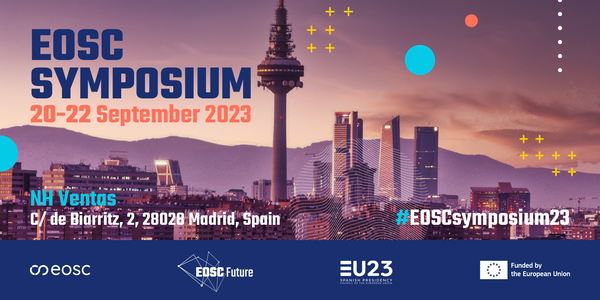
This year's Symposium underscored CESSDA's commitment to collaborative endeavours, fostering innovation, and contributing to the development of a robust and interconnected European Open Science Cloud. Our active involvement in diverse sessions reflects its dedication to advancing open science and promoting data sharing across disciplines. We are looking forward to the next year!